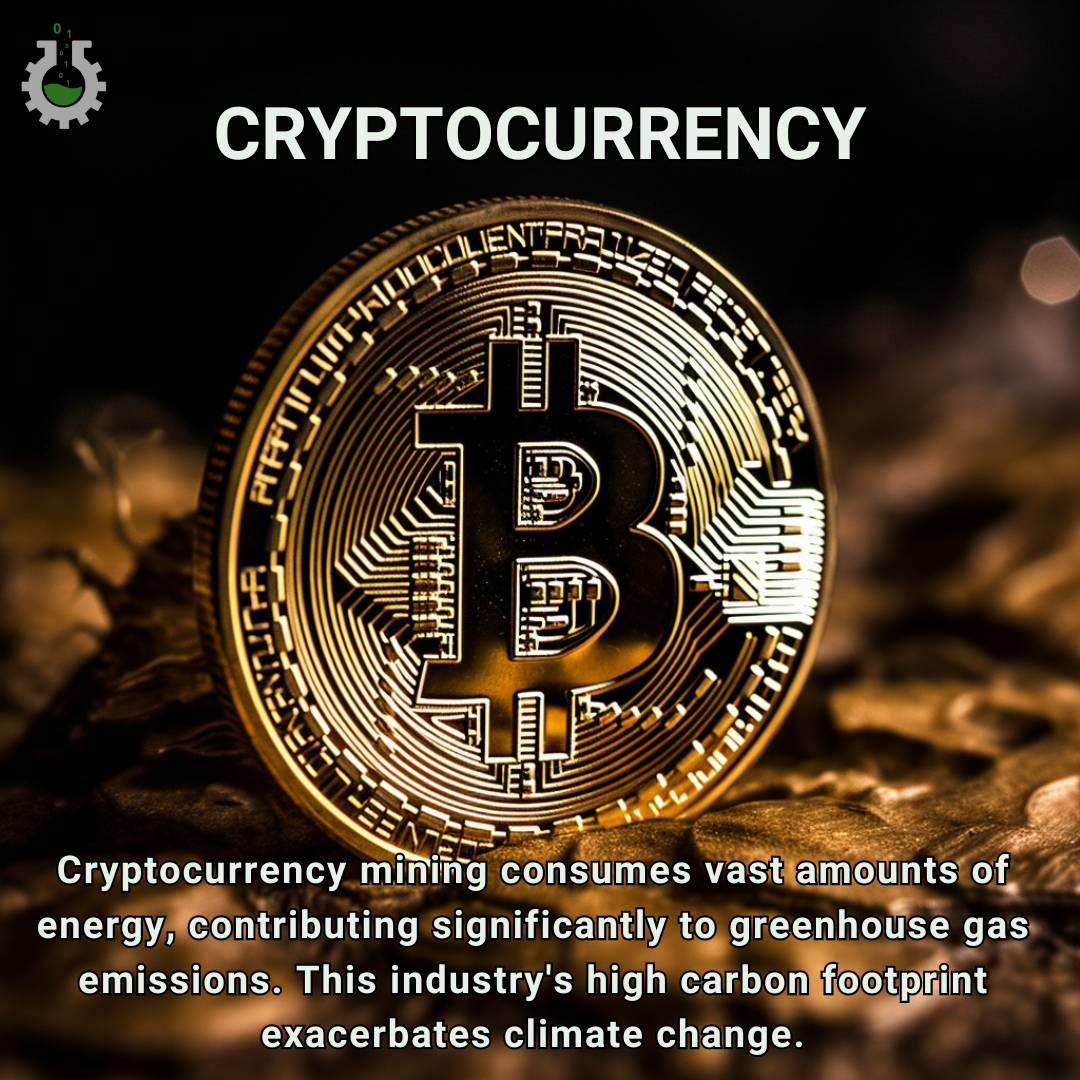May 24, 2024
Climate Change Poster Collection of the Day – Cryptocurrency
Book a Demo
Today’s Climate Change Poster Collection highlights Cryptocurrency, mining has emerged as a significant technological and financial phenomenon, but its environmental impact has become a growing concern. The process of mining cryptocurrencies, such as Bitcoin, involves solving complex mathematical problems to validate transactions on the blockchain. This requires substantial computational power, which in turn demands enormous amounts of electricity. Much of this energy consumption is derived from fossil fuels, particularly coal, which significantly contributes to greenhouse gas emissions. As the popularity and value of cryptocurrencies have surged, so too has the scale of mining operations, often concentrated in regions with cheap electricity. This has led to an alarming carbon footprint, exacerbating climate change. In addition to carbon emissions, the hardware used in mining, such as specialized ASIC (Application-Specific Integrated Circuit) machines, has a short lifespan and contributes to electronic waste. Efforts to mitigate these impacts include the development of more energy-efficient mining technologies, the shift towards renewable energy sources, and the exploration of alternative consensus mechanisms like Proof of Stake, which requires significantly less energy than the traditional Proof of Work method. However, these solutions face challenges in adoption and scalability. The cryptocurrency community and policymakers are increasingly recognizing the need for sustainable practices, but the path forward requires coordinated global efforts to balance the benefits of this innovative technology with its environmental costs. As the world grapples with the urgent need to address climate change, the cryptocurrency mining industry stands at a critical juncture, where its future growth must be aligned with ecological responsibility.
The environmental ramifications of cryptocurrency mining extend beyond just electricity consumption. The sheer volume of e-waste generated by obsolete mining hardware is another pressing issue. These machines, often discarded after a few years of use, contribute to the growing problem of electronic waste, which contains hazardous materials that can contaminate soil and water. The rapid turnover of mining equipment, driven by the relentless pursuit of higher efficiency and profitability, exacerbates this issue. Moreover, the energy-intensive nature of cryptocurrency mining has led to significant localized environmental impacts. In some regions, the high demand for electricity has strained local power grids, leading to increased reliance on fossil fuel-based power plants and higher electricity prices for residents. This has sparked debates about the equitable distribution of energy resources and the social implications of prioritizing cryptocurrency mining over other essential services.
Despite these challenges, there are promising developments in the quest for more sustainable cryptocurrency mining practices. Some mining operations are relocating to regions with abundant renewable energy sources, such as hydroelectric power in Iceland and geothermal energy in El Salvador. These initiatives demonstrate the potential for aligning cryptocurrency mining with renewable energy infrastructure, reducing the carbon footprint of the industry. Additionally, technological advancements are being made to improve the energy efficiency of mining hardware, with companies investing in research and development to create more efficient ASICs and other mining equipment. The adoption of alternative consensus mechanisms, such as Proof of Stake (PoS) and Proof of Space (PoSpace), also offers a pathway to significantly reduce the energy consumption of blockchain networks. PoS, for example, relies on validators who are chosen based on the number of coins they hold and are willing to “stake” as collateral, rather than on computational power. This method drastically cuts down the energy required to maintain the network’s security and integrity.
However, transitioning to these more sustainable practices is not without its hurdles. The decentralized nature of cryptocurrencies means that changes to consensus mechanisms or energy sources require widespread agreement and cooperation among a diverse and often fragmented community of stakeholders. Additionally, the economic incentives that drive the current mining model are deeply entrenched, making it challenging to shift towards less energy-intensive methods. Policymakers and regulators also play a crucial role in shaping the future of cryptocurrency mining. By implementing regulations that encourage the use of renewable energy and penalize excessive carbon emissions, governments can steer the industry towards more sustainable practices. International cooperation is essential in this regard, as the global nature of cryptocurrency markets means that unilateral actions by individual countries may be insufficient to address the environmental impact comprehensively.
While cryptocurrency mining has brought about significant technological and financial advancements, it also poses substantial environmental challenges. The industry’s high energy consumption, reliance on fossil fuels, and contribution to electronic waste are critical issues that need to be addressed to ensure a sustainable future. By embracing renewable energy sources, improving mining hardware efficiency, and exploring alternative consensus mechanisms, the cryptocurrency community can mitigate its environmental impact. However, achieving these goals requires coordinated efforts from all stakeholders, including miners, developers, policymakers, and the broader public. As the world faces the urgent task of combating climate change, the cryptocurrency mining industry must evolve to align its growth with ecological responsibility, ensuring that the benefits of this innovative technology do not come at the expense of our planet’s health.
Discover an inspiring collection of climate change poster.



